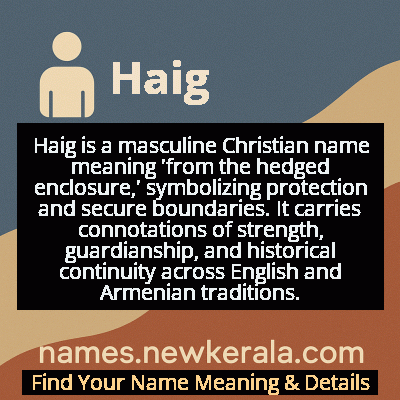Haig Name Meaning & Details
Origin, Popularity, Numerology Analysis & Name Meaning of Haig
Discover the origin, meaning, and cultural significance of the name HAIG. Delve into its historical roots and explore the lasting impact it has had on communities and traditions.
Name
Haig
Gender
Male
Origin
Christian
Lucky Number
7
Meaning of the Name - Haig
Haig is a masculine Christian name meaning 'from the hedged enclosure,' symbolizing protection and secure boundaries. It carries connotations of strength, guardianship, and historical continuity across English and Armenian traditions.
Haig - Complete Numerology Analysis
Your Numerology Number
Based on Pythagorean Numerology System
Ruling Planet
Neptune (Ketu)
Positive Nature
Intuitive, analytical, spiritual, and inquisitive.
Negative Traits
Secretive, reserved, aloof, and can be overly critical.
Lucky Colours
Green, yellow.
Lucky Days
Monday.
Lucky Stones
Cat’s eye, moonstone.
Harmony Numbers
1, 5, 6.
Best Suited Professions
Scientists, researchers, spiritual leaders, detectives.
What People Like About You
Depth of knowledge, analytical skills, spirituality.
Famous People Named Haig
Alexander Haig
Military Leader and Statesman
Served as U.S. Secretary of State under President Reagan and Supreme Allied Commander Europe of NATO
Douglas Haig
Military Commander
Commander of the British Expeditionary Force during World War I, later elevated to Earl Haig
Haig M. Manoogian
Film Educator
Influential film professor at New York University who taught Martin Scorsese and other notable filmmakers
Name Variations & International Equivalents
Click on blue names to explore their detailed meanings. Gray names with will be available soon.
Cultural & Historical Significance
The Christian context of the name adds another layer of meaning, as it has been borne by individuals within Christian communities who value its connotations of protection and stewardship. The 'hedged enclosure' concept resonates with biblical imagery of God as protector and the church as a protected community. In Armenian Christianity specifically, the name connects to the nation's early adoption of Christianity as the state religion in 301 AD, making it a symbol of both faith and national identity. This multifaceted cultural significance gives Haig a unique position among names that span geographical and historical boundaries.
Extended Personality Analysis
Individuals named Haig are often perceived as strong, dependable leaders with a natural inclination toward protection and responsibility. The name's origin from 'hedged enclosure' metaphorically translates to personality traits of creating safe spaces, establishing clear boundaries, and providing stability for others. They tend to be practical, grounded individuals who value tradition and structure while possessing the determination to defend what they believe in. Haigs are typically seen as reserved yet powerful presences—people who don't seek attention but command respect through their competence and integrity.
Their leadership style often combines strategic thinking with protective instincts, making them natural guardians in both personal and professional contexts. While they may appear somewhat formal or traditional initially, those who know them well appreciate their deep loyalty and unwavering commitment to their principles and loved ones. The Armenian cultural association adds dimensions of pride, historical consciousness, and cultural preservation to the personality profile. Haigs often demonstrate a strong sense of duty and may feel connected to larger historical narratives or family traditions, driving them to achieve in ways that honor their heritage while building their own legacy.
Modern Usage & Popularity
In contemporary times, Haig maintains a distinctive presence as both a first name and surname, though it remains relatively uncommon. Its usage has evolved from primarily Armenian communities to broader acceptance, particularly among families seeking names with historical gravitas and cross-cultural appeal. The name experiences periodic revivals, often influenced by historical anniversaries or cultural rediscoveries. While not ranking in mainstream popularity charts, Haig continues to be chosen by parents who appreciate its strong, traditional sound and multicultural heritage. Its association with military leadership and Armenian national identity gives it particular resonance in communities valuing historical continuity and cultural pride. The name's relative rarity in modern usage makes it distinctive without being unfamiliar, appealing to parents seeking unique yet meaningful names with deep roots and international recognition.
Symbolic & Spiritual Meanings
Symbolically, Haig represents protection, boundaries, and foundational strength. The 'hedged enclosure' etymology translates metaphorically to creating safe spaces, establishing clear limits, and providing sanctuary. This makes the name emblematic of guardianship and responsibility—the idea of creating secure environments where growth and development can occur safely. In Armenian tradition, Haig symbolizes national identity, resilience, and the enduring spirit of a people—representing both the founder and protector of culture against external threats. The name carries connotations of leadership that is both defensive and nurturing, suggesting someone who builds structures (whether physical, social, or moral) that protect and sustain communities. It embodies the paradox of strength through limitation—the idea that true freedom and safety come from well-defined boundaries and principled leadership. This symbolic richness makes Haig a name that speaks to both practical protection and profound cultural continuity.

